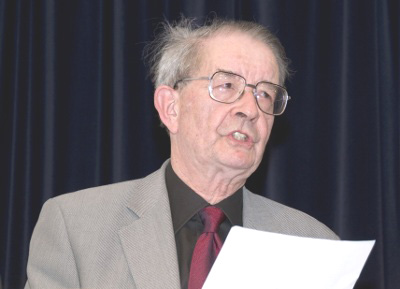
Former UKOLN Director Honoured by University
The first Director of UKOLN, Philip Bryant, has been awarded an Honorary Fellowship by the Senate of the University of Bath for his significant contribution to the development of bibliographic management. The award also recognises that his establishment of the Centre for Catalogue Research (1975-1980), the Centre for Bibliographic Management (1980-1992) and finally UKOLN (1992-) at the University created a reputation for excellence in this field.
Dr Liz Lyon, the current UKOLN Director said, 'I am delighted to learn of this award. Philip Bryant was instrumental in critical digital library development areas which have directly influenced how we routinely use online catalogues in all types of library today e.g. university, public, and national institutions such as the British Library. Philip also initiated the organisational mergers of Centres within the University which led to the creation of UKOLN in the early 1990s, funded by the British Library and Jisc. More recently, Philip joined Lorcan Dempsey and myself on the stage at the 30th Anniversary of UKOLN in 2008 at the British Library and we are deeply indebted to his foresight and dedication which have helped to progress the key library infrastructure that most people take for granted in 2013'.
Philip, who served as Technical Services Librarian to the Library alongside its Librarian Maurice Line, was noted for his ground-breaking research into library catalogues which had a major influence on library planning for the electronic age.
Initially Philip worked with Maurice on several projects looking at catalogues and bibliographic data, which led to the Bath University Programme of Catalogue Research (1977-79). Philip became Director of the newly formed Centre for Catalogue Research, funded by the British Library R&D Department, in 1977. He then oversaw the Centre’s transformation in 1987 into the Centre for Bibliographic Management in recognition of the role the Centre was playing in the wider book world, both in the UK and internationally. He was also instrumental in the recruitment of Lorcan Dempsey and Ann Chapman as research officers. Some two years later, the UK Office for Library Networking was established after a grant was made by the British Library Research and Development Department (BLRDD).
In 1992 Philip oversaw the merger of the CBM and UK Office for Library Networking into UKOLN before stepping down as Director some two years later. Philip continued to work for the University of Bath as Senior Research Fellow in Bibliographic Management. During this time he investigated the quantity and subject matter of items for which there were no entries in online catalogues in Higher Education and non-Higher Education libraries, funded by Jisc and BLRIC respectively. After completing this work Philip retired in August 1997.
It is no exaggeration to assert that Philip Bryant’s work on library catalogues and their uses had the effect of placing the University on the map of the library world. A series of conferences in the 1980s and 1990s on bibliographic management, online access to library catalogues and networking digital information drew international delegates to the campus. In 1994 the University Librarian, Howard Nicholson, reported that Philip Bryant’s work during the 1970s informed a whole generation of library managers about how students used university libraries.
Later Philip’s study to establish ‘whether a national retrospective catalogue conversion programme is justified and to explore the implications of much wider access both to records and to actual collections so converted’, as recommended by the highly influential Follett Report, was of national importance (and international relevance) at the time, and remains relevant today. In addition to addressing the questions of how much retrospective conversion of research collections had already been undertaken, what remained to be done, what benefits would accrue to users from national investment in this conversion activity, and what was the evidence of the demand for access to such material which was not as yet being met, Philip and his colleagues investigated the likely costs, methods of assisting the process, and sources of funding that might be drawn on for carrying out such activities. The result was the strategy for the Retrospective Conversion of Library Catalogues in Institutions of Higher Education in the United Kingdom presented by Philip Bryant, Ann Chapman and Bernard Naylor to the Follett Implementation Group on IT (FIGIT) in June 1995, which resulted in additional funding being made available to libraries to make more catalogue records available online.
As a leader Philip expected staff to meet his high standards regarding the rigorous collection of data, use of scientific method and quality of prose in all written reports and publications, and did much to widen the horizons and experience of his staff who shared his outlook. He saw the Centre as an integral part of the University and built strong relationships with the Library, Computing Services and Statistics staff in the Maths department. Moreover, Philip was generous in acknowledging the efforts of other people in the success of the work undertaken by UKOLN and its antecedents.
Note: You can find latest updates on our home page and previous articles in Feature archive.